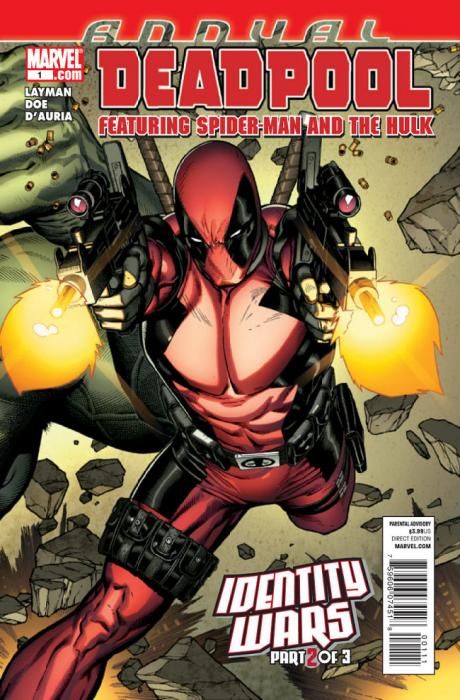This annual features the second part of John "Chew" Layman's big, multi-Annual Marvel story, "Identity Wars," which sees Spider-Man, the Hulk and this annual's star, Deadpool, transported to an alternate universe where things aren't quite as straightforward as they seem.
Strangely, where Layman's take on an alternate Spider-Man was quite funny and off-the-wall, with a bunch of nice character moments thrown in, his take on Deadpool is far less impressive. The tone is self-consciously wacky, and the jokes themselves are only occasionally well-executed.
Oddly, the most interesting plot twist comes a third of the way through the annual, and the book's climax is anti-climatic and perfunctory at best. It's not particularly bad, per se, just not remarkably good. When there's so much Deadpool material out there at the moment, being unremarkable isn't enough.
In particular, Layman struggles to give Wade Wilson the kind of internal lunacy we've come to expect from the character. He's a motormouth, but he doesn't have the same kind of Looney Tunes-style insanity that lies at the heart of Wade's unpredictability. Casting his counterpart as that reality's Doctor Doom makes little sense under any analysis, while the parade of alternate universe villains seems largely arbitrary. For a writer with Layman's pedigree, it's all a bit disappointing.
It doesn't help that artist Juan Doe also appears to have been in a rush. The character anatomy is shakier than usual, and the characters don't seem to properly inhabit their physical space, apparently floating over the top of backgrounds in more than one case. Doe has no problem executing the more slapstick comedy moments, but overall the whole thing could do with a polish. Since the inking was (apparently) done by Doe himself, a second collaborator could perhaps have helped the look of the artwork.
It's possible that the story is mainly suffering from being the second act in a three-issue story, and thus offering very little traction on the main plot besides taking the baton from one character and passing it to the other. At the same time, it's hard not to feel like this alternate reality is utterly forgettable. When the setting is so generic and the characters inhabiting it so arbitrarily different, it's tough to tell a story with any significance or insight.
And when the driving force of the changes appears to be a result of the difference between "our" Spider-Man and this one, maybe it's ultimately no surprise that a Deadpool Annual is left with very little to say on the matter.

